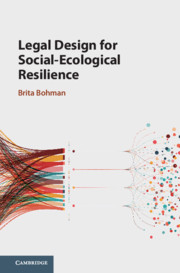Book contents
- Legal Design for Social-Ecological Resilience
- Legal Design for Social-Ecological Resilience
- Copyright page
- Contents
- Preface and Acknowledgments
- Table of Treaties and International Instruments
- Table of EU Law
- Table of Cases
- Abbreviations
- 1 Introduction
- 2 Environmental Law
- 3 Law and Governance
- 4 Defining Features for Resilience Governance
- 5 Adaptivity, Flexibility and Transformability
- 6 Multidimensional and Polycentric Structures
- 7 Stakeholders and Structures for Participation
- 8 Operationalization, Monitoring, Compliance and Trust Building
- 9 Conclusions – Effective Legal Design for Resilience Governance
- References
- Index
4 - Defining Features for Resilience Governance
Published online by Cambridge University Press: 10 March 2021
- Legal Design for Social-Ecological Resilience
- Legal Design for Social-Ecological Resilience
- Copyright page
- Contents
- Preface and Acknowledgments
- Table of Treaties and International Instruments
- Table of EU Law
- Table of Cases
- Abbreviations
- 1 Introduction
- 2 Environmental Law
- 3 Law and Governance
- 4 Defining Features for Resilience Governance
- 5 Adaptivity, Flexibility and Transformability
- 6 Multidimensional and Polycentric Structures
- 7 Stakeholders and Structures for Participation
- 8 Operationalization, Monitoring, Compliance and Trust Building
- 9 Conclusions – Effective Legal Design for Resilience Governance
- References
- Index
Summary
The overall study evaluates the role of law in governance for social-ecological resilience with the purpose to identify matching components for legal design. In order to review resilience governance and its compatibility with law, it is necessary to define more concrete prerequisites for effective resilience governance, in short, resilience features. This chapter defines such features, reviewed in depth throughout the study. In summary, these features are adaptivity; multilevel governance; stakeholder participation; and monitoring and control. Adaptive governance is central in resilience governance. It builds on a structure that includes actors across scales, or levels, that can gather knowledge. In large-scale international systems as the legal system, this includes science. An adaptive governance system also relies on monitoring and evaluation as part of the knowledge gathering that feeds in to the system. It allows for adjustments of the measures taken and thus transformation of the system into a more resilient state.
Keywords
- Type
- Chapter
- Information
- Legal Design for Social-Ecological Resilience , pp. 61 - 71Publisher: Cambridge University PressPrint publication year: 2021

